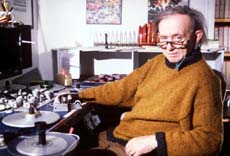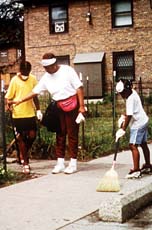Blabbermouths
A documentary about the people who lecture the poor.
Public Housing
Directed by Frederick Wiseman
PBS; Monday, Dec. 1; 9 p.m. EST in most markets. Click for local listings.

Public Housing, Frederick Wiseman's new documentary about Chicago's Ida B. Wells Housing Development, aspires to the sort of classical detachment that academic anthropologists cultivated before they realized that no such stance was possible and overcorrected in the other direction. Instead of trying to be flies on the wall, they became ants at the picnic. They crawled all over everything. Rather than listen, they talked, and rather than measure things clinically, they supposed--then deconstructed their suppositions. Over time, something similar happened with documentaries. The project of trying to know the other (Nanook of the North) became another reason to probe the self (Sherman's March).
Wiseman is having none of it. As Public Housing, his 28th film, attests, the grand old man of unobtrusive, I-am-a-camera documentary movie making (Titticutt Follies, High School, Hospital, Juvenile Court) still believes in standing back, facing forward, and shutting up. Early in the three-hour film, a woman is hassled for loitering by two cops who seem to suspect her of illegal drug use. Wiseman provides no background for the scene, just patiently lets it play itself out, even when it gets boring, which it does. First the cops act stern with the woman, berating her for ignoring an earlier order to move along. The woman doesn't react. Next the cops try tough love, predicting certain doom for her unless she cleans up her act. She stands there numb. Finally one of the cops tries a pep talk. They tell her she has "potential." Nothing. The scene ends in stalemate. As if trapped in an urban Ionesco play, the cops have said all the right things, the woman has gone through the motions of listening, and tomorrow the ritual will be repeated.

I f the austere, meandering Public Housing has anything so blatant as a theme, it's the impotence, for poverty, of the talking cure--the endless stream of sex-education classes, group-therapy sessions, self-esteem talks, inspirational lectures, and issue-oriented puppet shows directed by the haves at the have-nots. Scene after scene comes down to the same thing: one person giving advice or encouragement (canned, sincere, or both) to someone else who is too stoned, defiant, or damaged to profit from it, assuming they're even listening. So pure is Public Housing's indictment--not of racism or injustice but of the pathetic means by which society pretends to battle them--that it's hard to discern at first. The film begins conventionally, by giving us someone to root for. The name on her desk is Helen Finner. She's black, half toothless, and president of the tenants' council; she is seriously pissed off as she browbeats a housing official over the phone on behalf of a homeless pregnant girl. Though it's clear that Helen is playing to the camera, Wiseman doesn't intervene, because sometimes neutrality means letting people perform--especially if you happen to agree with them. And conveniently for the audience, Helen's speechifying ("No one under the sun should be homeless with all these units vacant in public housing!") evokes a familiar moral universe where passion ceaselessly battles red tape. The scene leaves the good liberal viewer feeling secure that he knows who the villains are, who the heroes are, and what the fight is about.
That security slowly dissipates. One way Wiseman moves around the housing project is by following service people on their rounds. In one scene he watches a courtly exterminator spraying poison in a woman's kitchen. The man gets in the corners, he squirts around the baseboards, but there's something ineffectual about his efforts--as though he knows, in his bones, that the rats will win. When he instructs the woman in the application of boric acid, giving specific directions about its placement, the woman seems to appreciate his concern. But she also grows more hopeless. She tells him she needs an exterminator every day, not just once in a blue moon, and he responds by complimenting her housekeeping and gradually easing his way toward the door. He's free, with a job to do and places to go, but the woman seems stuck in her poison-laced apartment.

T he sense of inertia grows heavier from there. We meet some men arranged around a table in an anonymous utility room. They've given themselves a proud title, "Men of Wells," and they obviously consider themselves role models for the younger black men in the project. They're full of brave talk about responsibility and other Million Man March-style self-help buzzwords, but they have a crippling problem: low attendance. As the men go around the table exhorting each other, making excuses, and promising to do better, the meeting becomes a meeting about not meeting. The men want to do the right thing, but they just can't, and why they can't is left a mystery.
The sharpest enactment of the theme of futility is an extended lecture on birth control to a roomful of women holding babies. The kids scream and holler as the earnest teacher holds up a condom and describes its use--a bit too late for these particular women, who are already mothers and are overwhelmed. The reaction shots show blank stares as the lecturer--clearly a graduate of some public-health course whose jargon and attitudes she's swallowed whole--gamely perseveres, serving up interesting facts about sperm and comparing condoms by brand name and design. She seems to think that if she can just get through this, just finish her lecture, things will be all right--if not for the audience, then at least for her. Like other teachers and counselors in the film, she's found a foothold in the professional helping class, and even if her efforts don't save others, they're saving her. As long as she keeps talking.
Over and over, without context or analysis, Public Housing displays two types of people locked in a joyless, exhausting dance: the bright-eyed motivators and their dazed, distracted clients. A professional athlete holds forth on how to form small businesses. Perky puppets teach anti-drug rhymes to restless kids. A teacher guides a discussion on elder abuse. After a while the tenants seem like prisoners--not just of their crumbling apartments but also of the people trying to set them free. Leaky sinks and milling rats are bad enough, but what may be bleakest about living in public housing is having to serve as a captive audience for the latest reformer's bright ideas. Old-style liberals, it's said, threw money at social problems, but today's new-style ones throw words at them. Wiseman's film makes the effort seem like a subtle form of punishment.